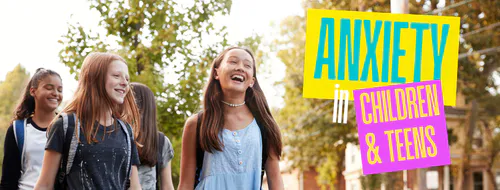ANXIETY in CHILDREN & TEENS | In-house Training
- Friday 1 January 2027
- 1:00 am - 1:00 am
- Your location
| CPD Hrs | 14 |
|---|
In-house training: This topic can be presented in your workplace, school or community. Email us.
Two-Day Intensive Workshop
Anxiety is stifling too many young lives, but it doesn’t have to be this way. Modern insights have greatly expanded our capacity to support young people to engage with all aspects of life with resilience and courage. This two-day workshop will present a fresh, innovative approach to anxiety. It will draw on neuroscience, evidence-based strategies, and highly respected therapeutic models to support practitioners in developing a fresh approach to anxiety and the therapeutic responses that will effect powerful change. This will be bolstered by a series of experiential exercises, allowing participants to consolidate learning, deepen their insight into their own personal processes, and acquire a range of innovative therapeutic interventions. Participants will learn:
- the neurobiology of anxiety and how to use this as a scaffold for therapeutic change;
- the different ways anxiety can manifest in young children and adolescents;
- how anxiety can interfere with learning, performance (exams, sport, on stage), behaviour and how to shift anxiety to
- maximise learning, behavioural, and performance outcomes;
- how to build high-quality relationships with children and teens, or facilitate those relationships with children and
- other important adults (such as school staff), and why this is a fundamental part of treatment;
- making sense of separation anxiety and how to respond effectively to support brave behaviour;
- working with school ‘refusal’ - an innovative, proven approach;
- how to engage parents to be changemakers, why well-intended responses from parents often make anxiety worse,
- and the conversation and strategies that can have a transformational impact on anxiety;
- what to do when parents are resistant to the therapeutic process - moving past the impasse;
- how to respond to anxiety and resistance in the moment to make way for calm and courage;
- when peer relationships contribute to anxiety - the profoundly powerful way of working with bullying and strained
- peer relationships to build relational safety for all young people;
- the critical elements of ‘presence’ that children need from parents and important adults, and how to facilitate this;
- building the toolbox - practical strategies to diminish the inner experience of anxiety and build brave behaviour;
- the four key responses to anxiety, and how to use this to inform a more effective response;
- why old responses to anxiety can be resistant to change, and the simple explanation for young people that can
- break through this and build resilience and courage;
- the neuroscience of self-regulation, co-regulation, and the impact on anxiety immediately and in the long-term;
- how a young person’s attachment history can impact anxiety and how to work with this;
- the relationship between trauma and anxiety, and how to build relationships that heal and protect;
- bringing it all together - a therapeutic roadmap detailing a practical, innovative plan for working with anxiety.
Presented by: Karen Young (BSc (Psych) Hons, Mast GestTher) Karen began her career as a psychologist and is now recognised as a leading authority on child and adolescent anxiety. She is a sought-after speaker, educator, and consultant and works with parents, schools, government bodies, and child and adolescent-focused organisations both in Australia and internationally. Karen is the founder of ‘Hey Sigmund’, an internationally popular online resource that provides contemporary, research-driven information on anxiety and the neurodevelopment of children.
She has written five books, including the bestselling ‘Hey Warrior’, which creatively assist children tounderstand and manage anxiety.
Audience: for Mental Health and Education Professionals at all levels & any professional that applies attachment theory, neuroscience and behavioural/developmental/relational science to their practice.
Mental Health Professionals: All mental health professionals including, but not limited to Clinical Counsellors, Psychologists, Psychotherapists, Psychiatrists, Social Workers, Nurses, Occupational Therapists, Youth Workers, Mental Health Workers, Family Therapists, Child Protection/Disability Workers, Guidance Officers, Speech Language Therapists, Residential Care Workers, Foster Support Workers, General Practitioners and all other mental health professionals looking to enhance their therapeutic skills.
Education Professionals: Professionals who teach children or youth including, but not limited to Teachers, Principals, School Counsellors, School Paraprofessionals and all other professionals who support behavioural challenges and complex learning needs.












